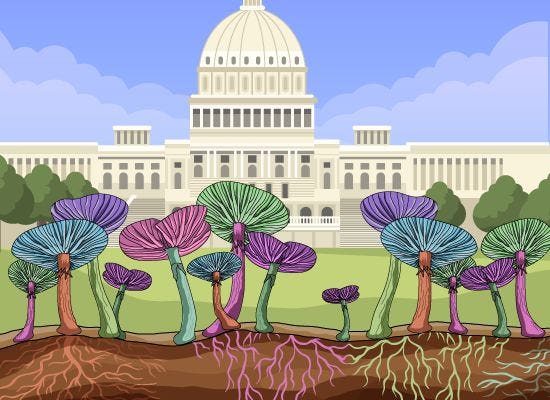Notes from Underground
Fungal ecosystem investments promise big returns—maybe even bipartisan cooperation!
More than a decade ago, I wrote a book called Nature’s Fortune: How Business and Society Thrive by Investing in Nature. Its central thesis was that investing in nature not only protects the environment for us, other species, and future generations, but it also produces enormously useful outcomes at very low cost. Things we may take for granted, like clean water, healthy food, protection from storms, outdoor areas to enjoy, habitat for biodiversity, and so on.
Interestingly, initiatives to invest in nature have another significant positive byproduct: they tend to generate broad engagement in a way that dramatically reduces divisiveness and polarization. Turns out, protecting nature for practical reasons—including saving money—is something most people can get behind. That could be timely, right?
Right now seems like a good time to revisit this opportunity. We can pursue the ideas originally discussed in the book with more energy. And I can add a new one to the list too: investments in underground mycorrhizal networks, which also produce significant multiple win-win-win outcomes.
Strong and healthy mycorrhizal networks lead to a variety of significantly enhanced outcomes in important pursuits such as:
Above-ground conservation of nature. Something that has always enjoyed widespread support—think hunters and treehuggers working together to protect parks.
Nature-based carbon removal. For example, scientists estimate that protecting just 20% of currently unprotected mycorrhizal carbon drawdown hotspots will preserve 500 Mt CO2e drawdown annually.
Please check out these amazing videos published by the NYTimes that show exactly how “underground fungal networks are living algorithms that quietly regulate Earth’s climate.”
Growing food. Fungi increase nutrient density in crops, enhance the size and sweetness of flowers for pollinators, help plants survive droughts, and create living scaffolds that build soils while preventing chemical runoff.
Fungal ecosystems are also important in their own right, likely leading to important scientific breakthroughs in pharmaceuticals and other areas.
For more than 450 million years, fungi have evolved ingenious strategies to capture nutrients, sequester carbon, supply water, remediate toxic compounds, and so much more. Yet, if we fail to protect these underground communities, we will lose this library of solutions, many of which will prove vital to humans in the future. Without diverse mycorrhizal communities, carbon sequestration diminishes, agricultural productivity declines, resilience to drought deteriorates, and so on.
In this time when building a political consensus to address many challenges (including the climate crisis) is exceedingly difficult, investing in nature stands out as a strategy that should be supported on a non-partisan or bipartisan basis. Doing so just makes common sense and will reduce risks, produce needed services, save money, and protect nature for all.
Most of us want to be proactive and do something practical about today’s political challenges. Here’s one good way to do exactly that—let's push our elected leaders to take full advantage of this opportunity to invest in nature, including its invisible but essential underground ecosystems.
***
I will note that I am not an unbiased observer. I serve as the board chair for SPUN, which is a joy and a great honor, because I truly believe in its mission. SPUN is one of several organizations addressing opportunities to fully understand and conserve underground mycorrhizal ecosystems. Check out my interviews with CEO Toby Kiers and Senior Advisor Merlin Sheldrake to learn more cool stuff about fungi from these two inspiring leaders.
If you’re more ambitious, please read Merlin’s superb book, Entangled Life: How Fungi Make Our Worlds, Change Our Minds & Shape Our Future. The book is truly great. Everybody I know who has read it loves it. It has also received positive reviews from diverse and intelligent readers like Margaret Atwood, Jaron Lanier, Brian Eno, Michael Pollan, Ed Yong, and Robert Macfarlane. If you read it, I’d love to hear your thoughts.
Onward,



Such a pleasure to read